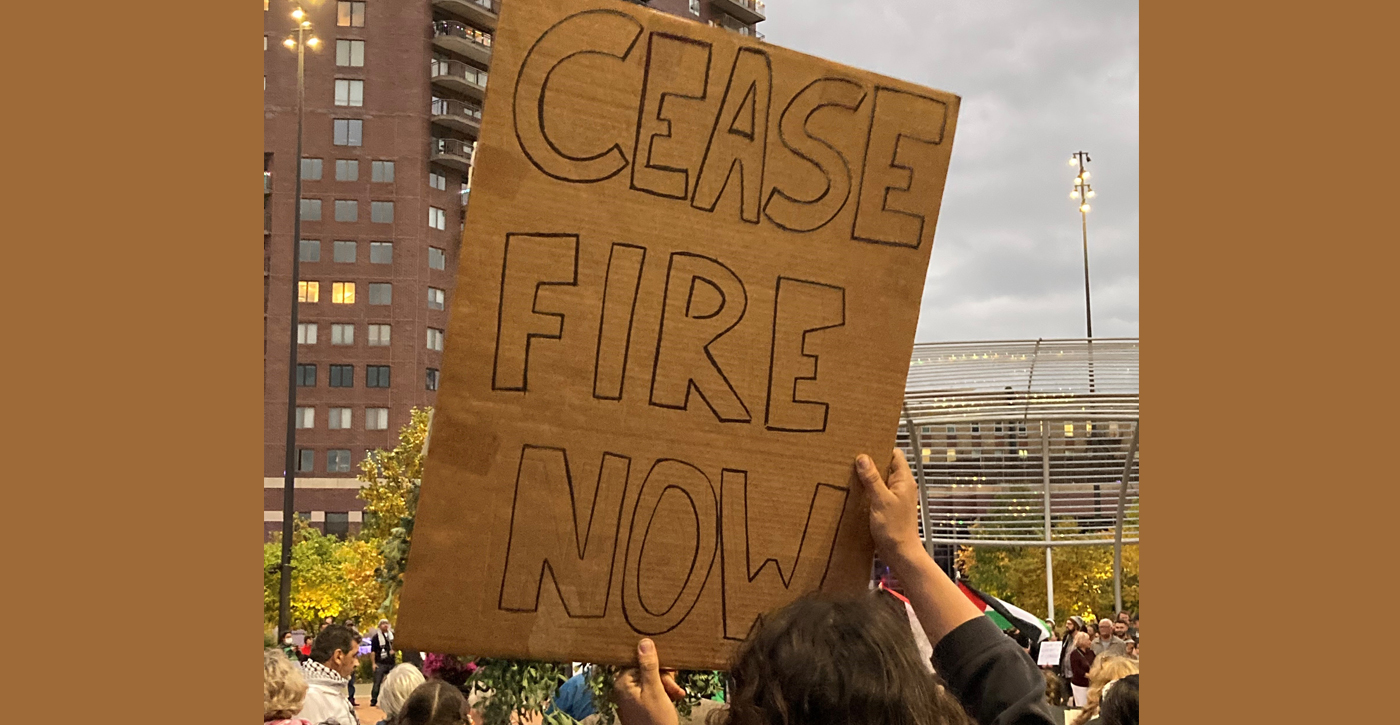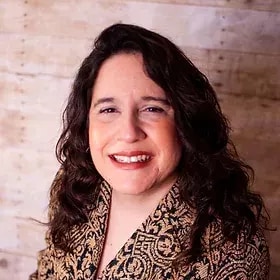As the war between Israel Defense Forces and Hamas continues, Quakers around the world are calling for a ceasefire and humanitarian aid. Members of the Ramallah Friends School community in the West Bank mourn lost loved ones and try to calm panicking students. Quaker aid workers in the United States fear for their colleagues in the region. Friends in Ireland and the United Kingdom endorse international support for a long-term peace process.
The most recent escalation of hostilities between the Israel Defense Forces (IDF) and Hamas began with an October 7 Hamas incursion into Israel that led to an IDF retaliation. The fighting has taken the lives of 1,400 Israelis with 5,400 wounded, and it has killed 7,028 Gazans and injured 18,400 as of October 26. Hamas is holding more than 200 people hostage, including Israelis and foreign nationals. Almost all humanitarian aid to Gaza is blocked and the current escalation has displaced almost 1.4 million Palestinians. Gazans have run out of food, water, and the fuel needed to run essential service providers such as hospitals.
“We need ceasefire and restraint. We need protection of civilians, that means hostages, that means Palestinian civilians in Gaza. We also need respect for international law, and right now we’re not seeing that,” said Hassan El-Tayyab, legislative director for Middle East Policy and advocacy organizer at Friends Committee on National Legislation (FCNL).
El-Tayyab noted that Quakers and other concerned citizens have sent Congress members nearly 55,000 emails calling for a ceasefire. FCNL has sent Congress two coalition letters, one from 28 Christian denominations and another from 78 interfaith and secular groups, including Jewish Voice for Peace Action and the Council on American–Islamic Relations.
Although students at Ramallah Friends School (RFS) are not in Gaza, the war has deeply shaken their community.
A former RFS staff member lost two cousins in the war. A ninth-grader was weeping at school after losing a relative in the conflict, according to Rania Ma’ayeh, head of school. Two staff members have close relatives in Gaza, including one teacher who fears for the safety of her sisters there.
Forty students and seven staff members cannot attend school in person due to the war, according to Ma’ayeh. When the Israeli army came to the town, the entire school switched to virtual learning.
Ramallah Friends School educates elementary and secondary Palestinian students at two campuses in the West Bank. Quakers began educating girls in Ramallah in 1869, and the first iteration of the school began in 1889 with an initial enrollment of 15 girls. A boys school opened in 1901. Boys and girls learned together on a limited basis starting in 1902; the school offered fully coeducational classes starting in the 1990s.
In grades one through ten the school provides counselors online to listen to and support students, according to Ma’ayeh. Ma’ayeh recently hired a yoga and breathing instructor to help pupils and staff members with their fear. Staff and students use music and art to express their anxiety. Counselors advise parents to avoid letting their young children see or read news of the war. Ma’ayeh, who is a practicing Quaker, offers students and staff, almost all of whom do not identify as Quaker, the opportunity to practice periods of centering silence.
Ramallah Friends School has 1,600 students. One pupil offered Ma’ayeh this insight about previous estimates of Palestinian child casualties: “‘Consider that the number of children who have tragically lost their lives equals the number of children here on our campuses,’” Ma’ayeh said.
Asked about the loss of Israeli lives in the Hamas attacks, Ma’ayeh described them as “very tragic” and observed that she does not wish for anyone to have to mourn for their loved ones.
Ma’ayeh requests prayer support from international Quakers and urgently wishes for a third way to open between both sides of the war.
The 2.2 million people who live in Gaza are governed by Hamas and rely on the organization for all public services, according to Mike Merryman-Lotze, Just Peace Global policy director at American Friends Service Committee (AFSC). Gaza residents need the municipal services, such as education, tax collection, and trash removal, that Hamas provides but do not necessarily support the attacks by its armed wing.
When inaugural Palestinian elections occurred in 1996, Hamas refused to run, according to Jonathan Evans, who has led Westtown School trips to the Middle East since 2010. Evans worked as the Catholic Relief Services country representative for Jerusalem, West Bank, and Gaza from 1992 to 1997.
In 2006, Hamas ran successfully under the party name Change and Reform and promised to address government corruption even as it opposed a two-state solution, according to Evans. The Palestinian National Authority, Israel, and the United States attempted to prevent Hamas from governing but it assumed power by force in 2007.
Elections have not been held since 2006 so it is impossible to gauge whether the majority of Gazans currently support Hamas, according to Jennifer Bing, national director of the Palestine Activism Program at AFSC.
Those who planned and carried out the Hamas attacks are correctly recognized as criminals under international law, according to Merryman-Lotze. In 2009 and 2014, Israeli bombings in Gaza killed thousands of Palestinians, violating international law, according to Merryman-Lotze. Whole families died and others had their homes decimated.
“Violations by Israelis need to be considered, and there needs to be accountability for those actions in the same way that there’s demand for holding up accountability for Palestinians,” Merryman-Lotze said.
Culminating in May of 2018, Palestinians coordinated weekly protests called the Great March of Return in which they opposed Israel’s blockade on Gaza and asserted their right to return to land on which they had previously lived. Israel restricts Palestinians’ travel outside the enclave. Snipers from the Israeli Defense Forces shot some of the demonstrators, according to Bing.
“The international community didn’t respond. We just left them in their cage,” Bing said.
The IDF fatally shot 227 protestors during the demonstrations, which took place along the border wall between Gaza and Israel. The IDF stated that the protests were organized by Hamas terrorists and that the IDF shot them to prevent them from breaching the security wall and attacking Israeli soldiers and civilians.
Bing notes that despite the long history of Israeli–Palestinian violence, there are examples of individual compassion between the sides that stand out. She has Israeli and Jewish friends who are trying to protect Palestinian villages in the West Bank. Some AFSC staffers in the area are supporting conscientious objectors who refuse to serve in the IDF, according to Bing.
Bing worries constantly about the safety of people she knows well in the region.
“I wake up every morning to see if my colleagues are alive, and my friends, and you know, I breathe a sigh of relief when I see that they’ve posted something on a social media platform or I get news from another friend,” Bing said.
Merryman-Lotze experiences similar dread.
“The message from one of our staff members this morning, who had been ordered to evacuate, he sent his family south and he asked to stay in his home with his mother who can’t evacuate and he called to say goodbye. He expects to die in the next period. So that’s the reality that we’re living with,” Merryman-Lotze said in an October 13 interview.
As Quakers worldwide worry about the casualties of war, yearly meetings in Ireland and the UK are supporting humanitarian aid efforts, opposing religious persecution at home, and endorsing the international community’s peacebuilding potential.
In response to the current war between the IDF and Hamas, Quakers in Britain corporately are one of the sponsoring churches for Christian Aid, an international humanitarian agency with programs in the region, according to Oliver Robertson, head of Witness and Worship for Quakers in Britain. British Quakers as a whole work with other organizations based in Israel, the West Bank, and Gaza to provide medical aid to residents of Gaza.
Locally, British Quakers are involved in interfaith groups seeking to support Jewish communities and publicly decry antisemitism. Friends are also participating in interfaith networks that care for Muslims and speak out against Islamophobia.
Robertson grieves the loss of Israeli and Palestinian lives. He notes that those mourning their loved ones will have to live with devastating loss for the rest of their lives. He opposes additional violence because it will cause more people to go into mourning.
Among British Quakers are those with Jewish and Muslim loved ones, according to Robertson. Quakers in Britain therefore endorse peace, human rights, and applying international humanitarian law to all parties of the conflict, according to Robertson.
On behalf of Churches Together in Britain and Ireland, the Quaker Peace and Social Witness program of Britain Yearly Meeting runs the Ecumenical Accompaniment Programme in Palestine and Israel (EAPPI) in the region, in which many Irish people are involved, according to Will Haire, clerk of Ireland Yearly Meeting. Irish Quakers have financially supported peace workers in the West Bank and Gaza. They also donate to Ramallah Friends School.
Through the process that ended the Irish Troubles, British and Irish Quakers learned that peace cannot be imposed by outside parties and that former combatants need support to make treaties permanent, according to Robertson. The United Nations estimates that half of all conflicts flare up again within five years of ending by negotiated agreements, according to Robertson.
“Building peace doesn’t finish when you have an agreement,” Robertson said.
The UN could play a role in negotiating an end to the IDF–Hamas war but that would require the UN Security Council first to commit to a ceasefire, according to Haire.
UN Secretary-General António Guterres called for a ceasefire, but the members of the Security Council did not agree on draft proposals offered by the United States and Russia.
In the past 15 years there has not been a peace process in the Middle East, according to Haire.
The peace process in Ireland had support of the European Union and of both parties in Washington, D.C. Such international support is necessary for an effective peace process in the Middle East, according to Haire.
“You have to have a long-term peace process. You have to find ways of involving everyone in this process,” Haire said.
Correction: the timing of the beginning of coeducational classes at Ramallah Friends School has been clarified.




Comments on Friendsjournal.org may be used in the Forum of the print magazine and may be edited for length and clarity.